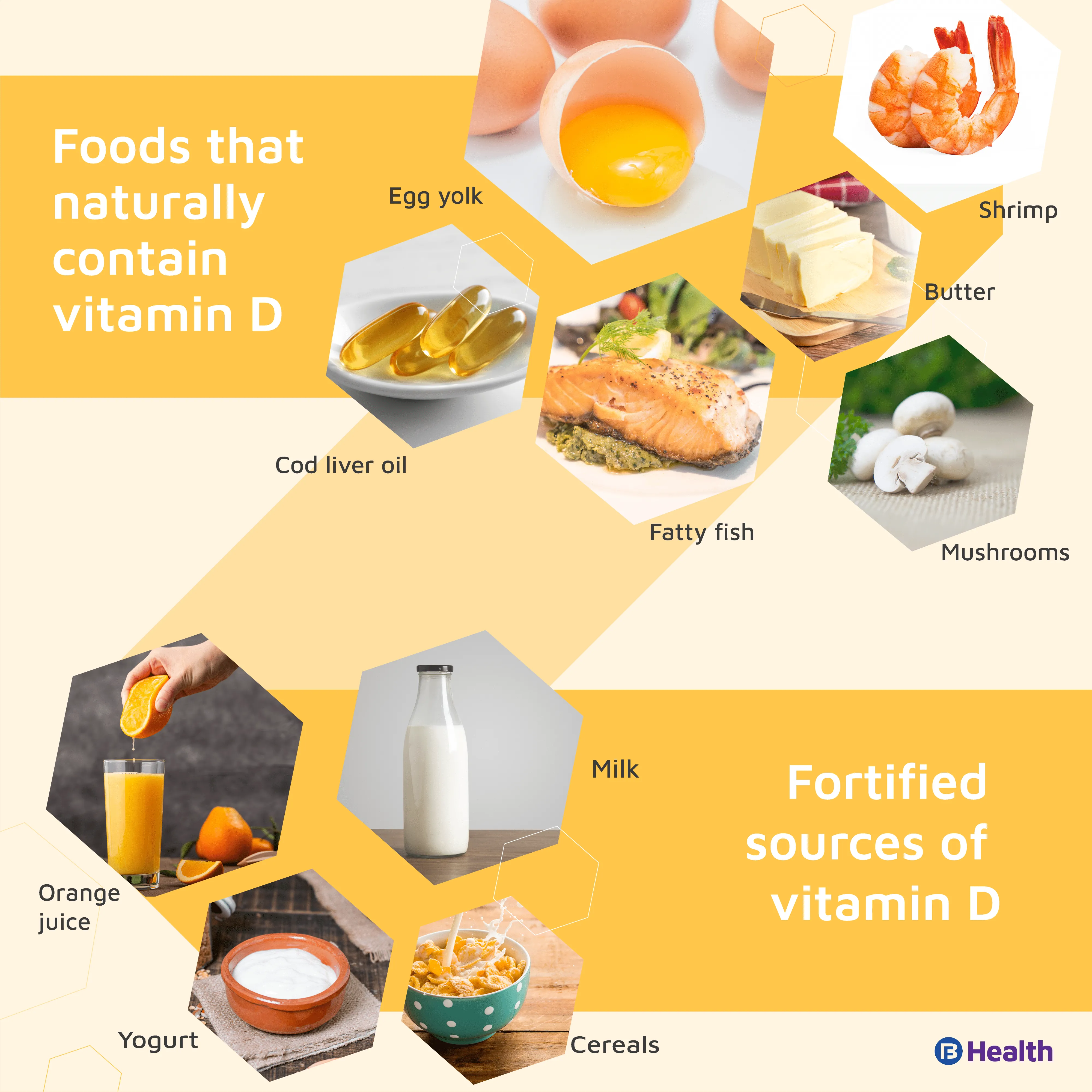Nutrition | 7 min read
Vitamin D Deficiency: Symptoms, Causes, Supplements, Foods
Medically reviewed by
Table of Content
Key Takeaways
- The recommended daily intake of vitamin D is 800 IU per day
- Vitamin D can be supplemented with natural as well as fortified food sources
- Take oral supplements or intramuscular injection for low levels of vitamin D
Wonder why you feel happy and content when your face is awash in that gentle morning sunshine? Alternatively, do gloomy, cloudy days get you down? It’s no wonder really—this is because vitamin D, also known as the ‘sunshine vitamin’, is produced in your skin in response to sunlight. Vitamin D is a fat-soluble vitamin and includes vitamins D-1, D-2, and D-3. It offers tons of benefits for your body including uplifting your overall mood and feeling of well-being. :et us understand the benefits, signs & symptoms of Vitamin D deficiency.
What is Vitamin D?
Vitamin D is important as it helps in calcium and phosphorous regulation in your body. This vitamin is required for improving your bone density. As the D vitamin is required for various body functions, vitamin D deficiency can affect your muscles and bones. It may also result in other problems like hair fall and digestion issues. Vitamin D3 deficiency symptoms occur if your body is unable to synthesize vitamin D directly from the sunlight or if you do not consume vitamin D-rich foods. This fat-soluble vitamin is present in a lot of foods, such as
- Salmon
- Tuna fish
- Fortified products
- Egg yolk
How Much is Considered Vitamin D Deficiency?
Vitamin D deficiency symptoms may develop if your body has low levels of vitamin D. Your body needs recommended amounts of vitamin D to maintain healthy bones and metabolize calcium in your body. If your vitamin D levels are between 50 and 125nmol/l, it is considered sufficient. However, if it crosses 125nmol/l, it can be harmful to your body. If vitamin D levels decrease up to 30nmol/l, you have a higher risk of vitamin D deficiency.
If you are 19 years or older, the recommended daily intake is 600 IU, which is 15mcg for both females and males. If you are aged above 70 years, you require 800 IU or 20mcg. For children and teenagers, the recommended daily intake is 600 IU or 15mcg. However, babies less than a year old require only 400 IU or 10mcg.
Symptoms of Vitamin D Deficiency
The recommended daily intake for vitamin D is approximately 400–800 international units (IU). More specifically, it is recommended that children, teens and adults up to the age of 70 get 600 IUs, while adults over the age of 70 require a minimum of 800 IUs. But we are not always able to receive these amounts naturally, which in turn leads to a vitamin D deficiency. It is very common, and in fact, it is estimated that approximately 1 billion people worldwide have low levels of the vitamin.
Signs & symptoms of vitamin D deficiency manifest in a number of ways, such as:
Low Immunity:
If you tend to get sick often, and have to deal with cold and the flu multiple times a year, a D vitamin deficiency could be the root cause for this.
Fatigue or Overall Tiredness:
Constantly dealing with tiredness, as well as headaches? It’s time to check your vitamin D levels as this is one of the common vitamin D3 deficiency symptoms. I In fact, studies have shown an association between vitamin D deficiency and fibromyalgia – a condition characterized by fatigue, muscle pains, and memory issues.
Aches and Pains:
If back pain or bone pains are bothering you, it could be low vitamin D levels again. Vitamin D helps with the absorption of calcium in the body, which is why when your D levels are low, this results in lower calcium levels and therefore, bone pains.
Slow Healing of Wounds:
When your wounds from an injury or surgery seem to take longer to heal, this is one of the vitamin D3 deficiency symptoms. This is because vitamin D increases the production of certain compounds that are vital for forming new skin as part of the wound-healing process.
Other Vitamin D deficiency symptoms include hair loss, hypertension, asthma, periodontal disease, recurring infections, and psoriasis. Vitamin D deficiency diseases can manifest as rickets in children (like bowing of the legs) and fragile bones or osteoporosis in the elderly. Furthermore, if your body doesn’t get the required amount of vitamin D, you risk developing bone abnormalities such as soft bones or osteomalacia.
Also Read: Rich Sources of Vitamin CCauses of Vitamin D Deficiency
There are a number of reasons that lead to a vitamin D deficiency. Since our body produces vitamin D as a response to sunlight, many of the causes arise from the lack of it.
- People who stay indoors most of the time, use a lot of sunscreen, live around tall buildings that block direct sunshine, live in areas with high pollution, are mostly in cities or towns that are more prone to high rainfall are more susceptible to vitamin D3 deficiency symptoms. Due to the lack of sunlight in these conditions, your body is unable to synthesize vitamin D.
- The causes of vitamin D deficiency also include certain medical conditions like Crohn’s disease, cystic fibrosis, and celiac disease where these conditions prevent the intestines from absorbing vitamin D taken through supplements.
- Age is also one of the causes of vitamin D deficiency as older people’s bodies may not be able to absorb enough of this vitamin from the intestine. Similarly, those who have less melanin on their skin i.e., those who are darker, take longer to absorb vitamin D.
- Obesity is another factor where a body mass index (BMI) greater than 30 tends to be associated with vitamin D deficiency. If you are obese, your body requires higher dosage of vitamin D supplements to maintain its recommended level in your body.
- Patients dealing with kidney and liver diseases also tend to face vitamin D deficiencies owing to the fact that these diseases reduce the amount of an enzyme needed to change vitamin D to a form that is used in the body.
- If you have undergone a weight loss procedure that reduces your stomach size, your body may find it difficult to absorb essential nutrients like vitamin D. This is also one of the vital causes of vitamin D deficiency.
- There are many medicines which may cause vitamin D deficiency. A few examples include medicines to lower cholesterol levels, laxatives and steroids. It is important to inform your doctor, so your vitamin D levels remain unaffected.
- Those who don’t consume foods rich in vitamin D may also experience vitamin D deficiency. This is common in babies who require more of this vitamin in the form of supplements as breast milk doesn’t contain adequate amounts.

Foods For Vitamin D Deficiency
You cannot only rely on sunlight for your daily dose of vitamin D and therefore, it is imperative to have other sources of vitamin D. It is important to know that vitamin D comes in two main forms which are vitamin D2 (ergocalciferol), and vitamin D3 (cholecalciferol). Vitamin D3 is only found in animal-sourced foods, while D2 mainly comes from plant sources and fortified foods.
There are a handful of food items that naturally contain vitamin D, while some other foods are fortified with this particular vitamin, which means vitamin D has purposefully been added to them. Foods that naturally contain vitamin D include egg yolk, shrimp, fatty fish like salmon, tuna, herring, and mackerel, cod liver oil, liver, butter, mushrooms exposed to sunlight, while fortified sources of vitamin D include milk, cereals, yogurt and dahi, and orange juice. So if your reports show a vitamin d 3 deficiency, you can include the above mentioned foods in your diet.
Also Read: Food and Vegetables rich in Vitamin C
Benefits of Vitamin D
This vitamin has plays several important roles in your body.
- It helps regulate the absorption of calcium and phosphorus
- It facilitates normal immune system function
- Helps with growth and development of bones and teeth
- Provides resistance against certain diseases
- It plays an important role in regulating your mood and keeping depression at bay
- Vitamin D keeps your hormone levels in check can help boost weight loss and decrease body fat
- It helps prevent heart disease
Treatments and Supplements for Vitamin D Deficiency
While sufficient amounts of sunlight and foods containing the essential vitamin are two ways to get your vitamin D readings up, doctors often prescribe vitamin D supplements which help boost your levels immediately.
Most doctors recommend vitamin D deficiency treatment with oral supplements or intramuscular injections. For those with vitamin D3 deficiency that has reached very low levels, a cholecalciferol injection of 6,00,000 IU is advised and is usually given once a year. This is often followed up with oral supplements as per prescriptions from your doctor. If your levels are not extremely low, your doctor may only advise oral supplements to be taken once a week for about 8-12 weeks. For elderly patients, a daily vitamin D supplement containing anywhere between 800-2000 IUs is usually suggested for D vitamin deficiency treatment.
For access to general physicians and diagnostic centers where you can check your vitamin D levels, you can use the Bajaj Finserv Health App. Here you can book appointments and schedule video consultations as well and get access to health plans to get deals and discounts from partner clinics and labs. Simply download the app for free from Google Play Store or the Apple App Story today to explore its many features!
References
- https://www.medicalnewstoday.com/articles/278323#:~:text=Vitamin%20D%20is%20essential%20to,system%20and%20helps%20cell%20communication.
- https://www.healthline.com/nutrition/vitamin-d2-vs-d3#:~:text=Vitamin%20D3%20Comes%20from%20Animals,plant%20sources%20and%20fortified%20foods.&text=Since%20vitamin%20D2%20is%20cheaper,common%20form%20in%20fortified%20foods.
Disclaimer
Please note that this article is solely meant for informational purposes and Bajaj Finserv Health Limited (“BFHL”) does not shoulder any responsibility of the views/advice/information expressed/given by the writer/reviewer/originator. This article should not be considered as a substitute for any medical advice, diagnosis or treatment. Always consult with your trusted physician/qualified healthcare professional to evaluate your medical condition. The above article has been reviewed by a qualified doctor and BFHL is not responsible for any damages for any information or services provided by any third party.





